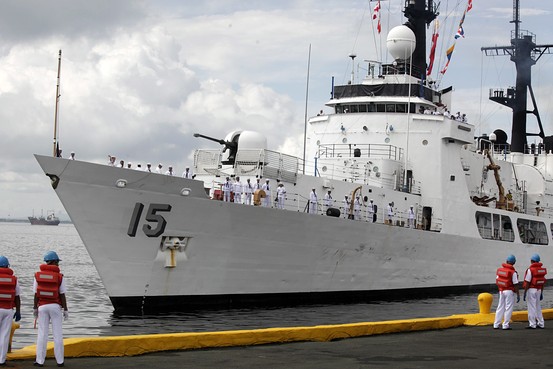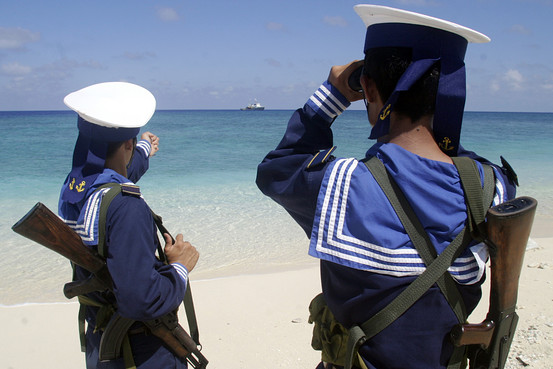The Philippine government said its newest warship is locked in a standoff with two Chinese surveillance vessels in a fresh dispute over fishing rights in the resource-rich South China Sea, potentially escalating an already-tense security environment in the contested region.
Wednesday afternoon, the Philippines said it had agreed with China to diplomatically resolve the dispute, according to the Associated Press.
European Pressphoto Agency The BRP Gregorio del Pilar, the Philippines' first Hamilton-class warship, docks at the Port of Manila in 2011.
Philippine Foreign Secretary Albert Del Rosario said he met with Chinese Ambassador Ma Keqing and both reaffirmed their governments' positions that the Scarborough Shoal where the ships are facing off was part of their own country's territory and neither was ready to stand down.
Mr. del Rosario said that despite the impasse, "we resolved to seek a diplomatic solution to the issue."
"The ambassador of China took the view that they have full sovereignty over the Scarborough Shoal," Mr. del Rosario told reporters after the meeting at his Manila office, according to AP. "So, in a sense we had reached an impasse in terms of our positions. And so there's a real challenge for us in terms of our agreement to keep on talking today."
The two navies engaged each other after the Philippine vessel—a former Coast Guard cutter provided by the U.S. Navy—attempted to arrest the crew of several Chinese fishing boats who were anchored at Scarborough Shoal, off the Philippines' northwest coast but which is also claimed by China. The Philippine government said Chinese surveillance vessels intervened to prevent any arrests, leading to the standoff, and that Filipino sailors who inspected the Chinese vessels on Tuesday found illegally collected corals and live sharks in one of the fishing boats.
China is locked in a series of overlapping territorial disputes with the Philippines, Vietnam, Malaysia, Taiwan and Brunei, who claim either all or part of the South China Sea as their sovereign territory. The dispute has flared in recent months as the region's potential energy reserves begin to draw growing attention.
Over the past year, Vietnam and the Philippines have accused Chinese navy craft of harassing oil-exploration vessels operating in their United Nations-defined maritime economic zones. Beijing has denied that, but has warned Vietnam and the Philippines from prospecting in the area without its permission.
"This is part of larger pattern. These new standoffs are coming to light only because we are better positioned to stand up to China now," said a Philippine military official who asked not to be identified.
China's foreign ministry in Beijing couldn't immediately be reached for comment. The Chinese Embassy in Manila released a statement earlier in the day saying that 12 fishing boats had sought shelter from a storm in a lagoon. "Two Chinese marine surveillance ships are in this area fulfilling the duties of safeguarding Chinese maritime rights and interests," the statement said, adding that the shoal "is an integral part of the Chinese territory and the waters around the traditional fishing area for Chinese fishermen."
Reuters Vietnamese navy personnel patrolled on Truong Sa islands, also known as the Spratly islands, on April 13, 2010.
The U.S., too, has angered China in stating that the South China Sea, which carries about half the world's trade, remains free for navigation. Washington has stepped up military and diplomatic ties with Hanoi and Manila, providing the refurbished cutter, now named the Gregorio del Pilar, to the Philippine navy last year and pledging to deliver another craft. Next week, the U.S. and Philippine militaries will resume an annual series of military exercises, including drills off the Philippines' western coast.
Those exercises appear likely to further antagonize Beijing. Already this week, a hawkish Chinese general has warned that the Philippines is facing its "last chance" to peacefully resolve sovereignty disputes over the South China Sea. Maj. Gen. Luo Yuan, writing in the Global Times newspaper, accused the Philippines of hijacking a recent Southeast Asian summit in order to further pressure China over the South China Sea, and warned that Manila's alleged provocations would fail.
"The biggest miscalculation of the Philippines is that it has misestimated the strength and willpower of China to defends its territorial integrity," Gen. Luo wrote.
While not necessarily reflecting the Chinese governments views, Gen. Luo's comments show signs of growing impatience with the Philippines after Manila adopted a more aggressive stance towards its South China Sea claims under President Benigno Aquino III, who was elected in 2010 and has since sought to revive the Philippines' sometimes fragile ties to the U.S.
Diplomats say the administration of former President Gloria Macapagal Arroyo was much more wary of antagonizing Beijing.
The Philippines is also working on developing a closer relationship with Vietnam.
Previously there was relatively little contact between the two countries, but now there is a growing military-to-military relationship that might soon result in the two countries holding formal exercises, or at least joint search-and-rescue training, diplomats say.
In addition, the Philippines has proposed holding soccer matches between Filipino and Vietnamese troops on some of the contested atolls in the South China Sea. Philippine Admiral Alexander Pama Tuesday told reporters the Philippines has suggested sending some sailors and troops to Vietnamese-occupied islands, while Vietnamese troops could visit Philippine-held islands. Adm. Pama said it could be called the "fun games," and stressed there would be no firearms training involved.
Source:The Wall Street Journal


 RSS Feed
RSS Feed
